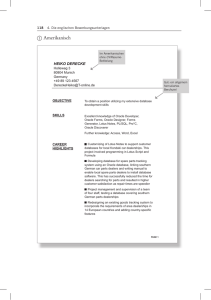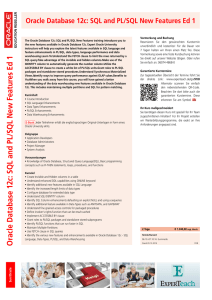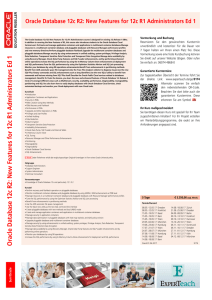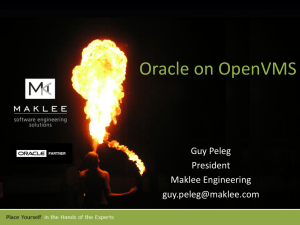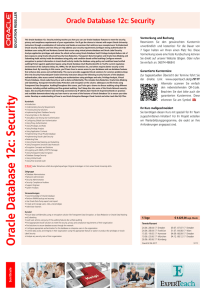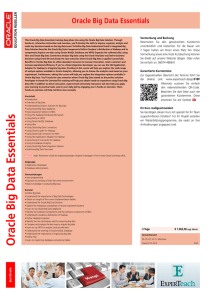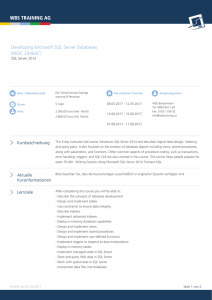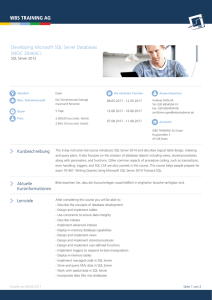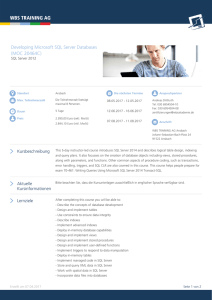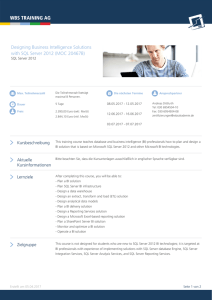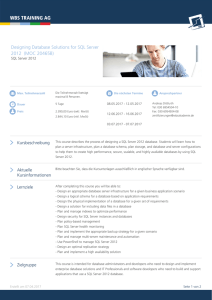Troubleshooting Oracle performance issues beyond Oracle
Werbung
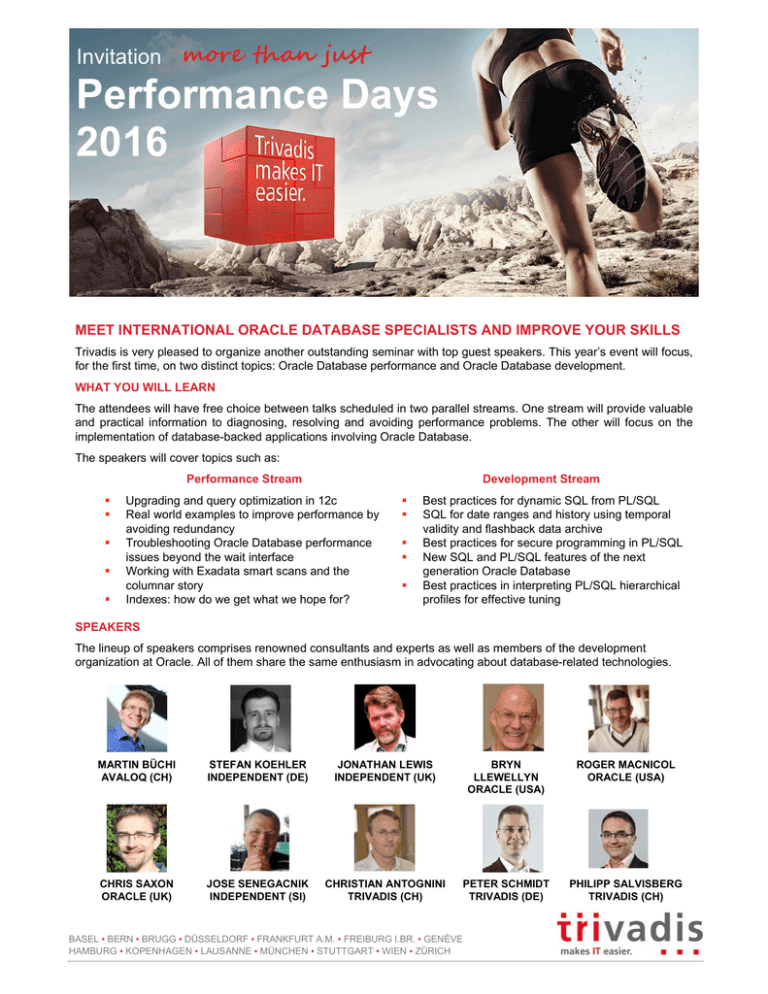
Invitation more than just Performance Days 2016 MEET INTERNATIONAL ORACLE DATABASE SPECIALISTS AND IMPROVE YOUR SKILLS Trivadis is very pleased to organize another outstanding seminar with top guest speakers. This year’s event will focus, for the first time, on two distinct topics: Oracle Database performance and Oracle Database development. WHAT YOU WILL LEARN The attendees will have free choice between talks scheduled in two parallel streams. One stream will provide valuable and practical information to diagnosing, resolving and avoiding performance problems. The other will focus on the implementation of database-backed applications involving Oracle Database. The speakers will cover topics such as: Performance Stream Development Stream Upgrading and query optimization in 12c Real world examples to improve performance by avoiding redundancy Troubleshooting Oracle Database performance issues beyond the wait interface Working with Exadata smart scans and the columnar story Indexes: how do we get what we hope for? Best practices for dynamic SQL from PL/SQL SQL for date ranges and history using temporal validity and flashback data archive Best practices for secure programming in PL/SQL New SQL and PL/SQL features of the next generation Oracle Database Best practices in interpreting PL/SQL hierarchical profiles for effective tuning SPEAKERS The lineup of speakers comprises renowned consultants and experts as well as members of the development organization at Oracle. All of them share the same enthusiasm in advocating about database-related technologies. MARTIN BÜCHI AVALOQ (CH) STEFAN KOEHLER INDEPENDENT (DE) JONATHAN LEWIS INDEPENDENT (UK) BRYN LLEWELLYN ORACLE (USA) ROGER MACNICOL ORACLE (USA) CHRIS SAXON ORACLE (UK) JOSE SENEGACNIK INDEPENDENT (SI) CHRISTIAN ANTOGNINI TRIVADIS (CH) PETER SCHMIDT TRIVADIS (DE) PHILIPP SALVISBERG TRIVADIS (CH) BASEL ▪ BERN ▪ BRUGG ▪ DÜSSELDORF ▪ FRANKFURT A.M. ▪ FREIBURG I.BR. ▪ GENÈVE HAMBURG ▪ KOPENHAGEN ▪ LAUSANNE ▪ MÜNCHEN ▪ STUTTGART ▪ WIEN ▪ ZÜRICH EXCERPT OF THE PRESENTATIONS IN THE PERFORMANCE STREAM JUST DON'T DO IT, JONATHAN LEWIS The fastest way of performing a task is to avoid performing it at all - 2nd best is to reduce the number of times you perform the task. In this session I'll examine a small number of recent examples of production code where careful analysis of the requirements showed how to re-engineer to avoid redundant work, allowing significant performance improvements. INDEXING, JONATHAN LEWIS In this session I'll start with a few comments on the effectiveness, selection and management of indexes - both B-tree and Bitmap - with a view to highlighting how we hope to benefit from their presence, how to make sure we get that benefit, and reasons why we may have to pay more than we'd like for that benefit. WORKING WITH EXADATA SMART SCAN, ROGER MACNICOL We will be looking at what happens when a table scan is offloaded to Exadata and things to understand in order to get the most from it, including some of the useful things to know around what can and can’t be offloaded, chained row handling, hybrid columnar compression, and LOBs. We will also look at the interaction with flash cache and storage index. THE COLUMNAR STORY, ROGER MACNICOL The next generation of Oracle Database introduces a new in-memory format columnar cache on Exadata that allows Database In-Memory to tier out to flash when the working set of data is too big for main memory. We will look at how columnar processing is integrated across the stack and how to get the most of an integrated columnar on storage and columnar in memory system. UPGRADING TO 12C, JOSE SENEGACNIK In this presentation we will discuss what to expect from the CBO after upgrade to 12c. Some databases are prone to unpredictable behavior and performance degradations. New features in 12c are intended to resolve the majority of such problems. Based on actual experience with several upgrades we will discuss what problems were resolved and how successfully they were resolved. TROUBLESHOOTING ORACLE PERFORMANCE ISSUES BEYOND ORACLE WAIT INTERFACE, STEFAN KOEHLER Oracle provides a lot of wait events, performance statistics and metrics. At times these metrics are not enough to drill-down to the root cause of a performance issue. This session provides insights into OS kernel debugging/profiling features and general Oracle debugging tools for revealing the Oracle C kernel code flow in the safest way and how to interpret the collected data at its best. QUERY OPTIMIZATION IN ORACLE DATABASE 12C, CHRISTIAN ANTOGNINI With every new release, the query optimizer is enhanced. The aim of this presentation is to review adaptive query optimization techniques, management of object statistics, plan stability, and optimization techniques from a practical point of view as well as to point out challenges related to them. I.e., to let you know what you can expect when you upgrade your Oracle Database. EXCERPT OF THE PRESENTATIONS IN THE DEVELOPMENT STREAM NEW SQL AND PL/SQL FEATURES IN THE NEXT GENERATION OF ORACLE DATABASE, BRYN LLEWELLYN You will get a first-hand insight into the new SQL and PL/SQL features of the latest Oracle database release. TRANSFORMING ONE TABLE TO ANOTHER: SQL VS PL/SQL, BRYN LLEWELLYN AND CHRIS SAXON You’ve heard the mantra “If you can do in SQL, do so; only if you can’t, do it PL/SQL”. Really? Always? What if you want to compute nonoverlapping RowID ranges that completely span a table. An exact solution is trivial; but it’s too slow for a table of typical size. This session examines some solutions. Some use only SQL; some combine SQL and PL/SQL. All pass the same correctness tests; all have comparable performance. Choosing one therefore reflects some subtle, subjective, considerations. BEST PRACTICES IN INTERPRETING PL/SQL HIERARCHICAL PROFILES FOR EFFECTIVE TUNING, MARTIN BÜCHI The PL/SQL hierarchical profiler is the primary tool to identify performance problems in PL/SQL programs. Whereas the creation of profiles is simple, the effective interpretation requires good visualizations an experience. This presentation shows 10 best practices for getting the most out of profiles based on 8 years of experience with a 20M line PL/SQL application. BEST PRACTICES FOR DYNAMIC SQL FROM PL/SQL, MARTIN BÜCHI AND BRYN LLEWELLYN Dynamic SQL and PL/SQL provide for the execution of statements whose structure is only known at runtime. Seven examples from a core banking system illustrate how to achieve optimal performance and scalability, avoid security problems, pass data to and from dynamic SQL, resolve unqualified names in a different schema, avoid invalidations, and run code in a different edition. SQL FOR DATE RANGES AND HISTORY USING TEMPORAL VALIDITY AND FLASHBACK DATA ARCHIVE, CHRIS SAXON Keeping a full history of changes to a table is a common business requirement. This is to ensure regulation compliance or understand how the business is performing. This session discusses the challenges to implement these requirements and shows how you can use temporal validity and flashback data archive to simplify working with date ranges and history tables. SECURE PROGRAMMING, PETER SCHMIDT Currently developed SW offers more and more flexibility and mobile applications results in a much larger user base than ever observed before. All of these features and the simplified access come, however, with a tradeoff: security challenges are increased in many ways. Increased awareness of threats like SQL injection and in-depth knowledge of how to incorporate secure programming techniques into one's own programs is essential for every PL/SQL developer today. EDITION-BASED REDEFINITION: THE KEY TO ONLINE APPLICATION UPGRADE BRYN LLEWELLYN UND CHRIS SAXON Edition-based redefinition (hereinafter EBR) was introduced by Oracle Database 11g Release 2. It is significantly improved in Oracle Database 12c. It enables you to patch and upgrade the user-created artifacts the implement the database backend of an application without interrupting the availability of the application. The technology was commissioned by Oracle's Applications Division. The general availability of Oracle E-Business Suite Release 12.2 was announced at OpenWorld 2013. From this release onwards, every patch and upgrade will be done as an EBR exercise. Several other well-known customers with Internet-facing applications are using EBR in production. BASEL ▪ BERN ▪ BRUGG ▪ DÜSSELDORF ▪ FRANKFURT A.M. ▪ FREIBURG I.BR. ▪ GENÈVE HAMBURG ▪ KOPENHAGEN ▪ LAUSANNE ▪ MÜNCHEN ▪ STUTTGART ▪ WIEN ▪ ZÜRICH SPEAKERS’ BIO Performance Stream Development Stream JONATHAN LEWIS, INDEPENDENT (UK) BRYN LLEWELLYN, ORACLE (USA) Jonathan Lewis is a well-known figure in the Oracle world with more than 24 years experience using the software. He has published three books about Oracle - the most recent being "Oracle Core" published by Apress Nov 2011 - and contributed to three others. He runs a couple of websites and contributes fairly regularly to newsgroups, forums, and User Group magazines and events around the world. Jonathan has been self-employed for most of his time in the IT industry. For the last 15 years he has specialised in short-term assignments, typically of a design, review, or trouble-shooting nature. He runs seminars about using Oracle all over the world and has visited more than 50 different countries to talk about, or trouble-shoot, Oracle systems. Bryn Llewellyn has worked in the software field for more than 35 years. He joined Oracle UK in 1990 at the European Development Center to work on the Oracle Designer team. He transferred to the Oracle Text team and then into consulting as the text specialist for Europe. He relocated to Oracle HQ in 1996 to join the Oracle Text Technical Marketing Group. He has been the product manager for PL/SQL since 2001. In 2005, he became responsible, additionally, for edition-based redefinition (EBR for short). Before Oracle, Bryn did image analysis and pattern recognition at Oxford University (programming in FORTRAN) and then worked in Oslo, at the Norwegian Computing Center and then in a startup, programming in SIMULA (its inventors were his close colleagues). This language is recognized as the first object-oriented programming language and was the inspiration for Smalltalk and C++. ROGER MACNICOL, ORACLE (USA) Roger MacNicol has been in the database industry for over 30 years: 85-95 in multi-dimensional databases, 95-05 as manager then architect for the Sybase IQ Query Engine (the world’s first commercial columnar database). He was the Chair of TPC-H when it was first launched. Since 05, he has been in Oracle: 2 years in Data Guard, then 9 years in Data Storage Technology responsible for HCC query evaluation, the table scan driver, and most recently as Software Architect for Smart Scan. Roger MacNicol is also a member of the Big Data SQL and In-Memory teams. JOŽE SENEGACNIK, INDEPENDENT (SI) Jože Senegacnik has more than 28 years of experience in working with Oracle products. He began in 1988 with Oracle Database version 4.1. Jože is an internationally recognized speaker, and a member of the highly respected OakTable Network. He was awarded Oracle ACE and Oracle ACE Director membership for his long record of positive contributions to the Oracle community. STEFAN KOEHLER, INDEPENDENT (DE) Stefan Koehler follows his passion about Oracle since +13 years and specialized in Oracle performance tuning, especially in Oracle cost based optimizer (CBO) and database internal related topics. Nowadays he primarily works as a freelance Oracle database performance consultant in large mission critical environments (e.g. +10 TB databases) for market-leading companies or multi-billion dollar enterprises in various industries all over the world. He usually supports his clients in understanding and solving complex Oracle performance issues and troubleshooting nontrivial database issues on short-term contracting basis. He is also a proud member of the OakTable Network. CHRISTIAN ANTOGNINI, TRIVADIS (CH) Since 1995, Christian Antognini has focused on understanding how the Oracle database engine works. His main interests include logical and physical database design, the query optimizer and basically everything else related to application performance management and optimization. He is currently working as a senior principal consultant and trainer at Trivadis in Zürich, Switzerland. Christian is a proud member of the OakTable Network, an Oracle ACE Director and the author of Troubleshooting Oracle Performance (Apress, 2008/2014) and the co-author of Der Oracle DBA (Hanser, 2011). MARTIN BÜCHI, AVALOQ (CH) Martin works as lead software architect for Avaloq, a provider of standardized banking software built on the Oracle RDBMS with 20M lines of PL/SQL running on multi-terabyte databases of 150 customers. Together with three colleagues, Martin defines the architecture and reviews the designs of 300 fulltime PL/SQL and Java developers, looking for simplicity, efficiency, and robustness. He was named PL/SQL Developer of the Year 2009 by Oracle Magazine, co-authored Expert PL/SQL Practices (Apress 2011), presented at OpenWorld, Hotsos, and ODTUG Kscope, and holds a Ph.D. in computer science. CHRIS SAXON, ORACLE (UK) Chris Saxon is a member of Steven Feuerstein's Developer Advocate team and the answer team on Ask Tom. In the ten years before this he worked as an Oracle developer, DBA and architect. In this time he built up a passion for interacting with data using SQL and helping others do the same. You can tweet him @ChrisRSaxon, follow his blog All Things SQL or his YouTube channel, The Magic of SQL. PETER SCHMIDT, TRIVADIS (DE) Peter Schmidt is a senior consultant in Oracle application development for Trivadis GmbH in Stuttgart, Germany. He has worked with Oracle databases since 1997, focusing on data modelling, SQL, PL/SQL and performance tuning. Besides his activities in many customer projects especially in the automotive industry, he likes to share his knowledge as a course instructor for PL/SQL and related secure programming courses. PHILIPP SALVISBERG, TRIVADIS (CH) Philipp Salvisberg is a senior principal consultant, partner and member of the boards of directors at Trivadis. He has been focusing on Oracle database based solutions since 1988 at that time with version 5. Since then he is helping customers to design, build and optimise their Oracle based solutions, teaching application development topics or speaking at conferences. Philipp has a soft spot for doing as much as possible in a single SQL statement and is very much interested in Oracle’s SQL and PL/SQL capabilities to use the database as efficiently as possible. BASEL ▪ BERN ▪ BRUGG ▪ DÜSSELDORF ▪ FRANKFURT A.M. ▪ FREIBURG I.BR. ▪ GENÈVE HAMBURG ▪ KOPENHAGEN ▪ LAUSANNE ▪ MÜNCHEN ▪ STUTTGART ▪ WIEN ▪ ZÜRICH WHEN IT IS PLANNED 28-29 September 2016 The working day will be from 9am to 5pm; and on the evening of 28th there will be an opportunity to share your experiences and opinions with the speakers and other participants in a less formal atmosphere as we meet over drinks from 5pm to 7pm. LANGUAGE The seminar will be conducted in English. TARGET AUDIENCE AND REQUIREMENTS Target audiences of this event are performance analysts, database administrators, application developers, as well as consultants who want to improve their skills in managing performance or developing database-backed applications involving Oracle Database. Participants are expected to have a working knowledge of Oracle Database. LIVE OR ONLINE Join us either live in Zurich or attend the sessions online in our virtual classroom. All sessions will be available as live stream for you. Requirements: access to the internet and headset. You will receive your personal account prior to the event. The account is valid for one person. VENUE The event takes place at the Swissotel Zurich, Switzerland. www.swissotel.com/hotels/zurich/map-directions/ PRICE Live in the Swissotel, Zurich, Switzerland: CHF 1,950 This price includes lunches and refreshments during the breaks. Live Stream: CHF 1,650 The live stream will be recorded. This price includes access to the recordings exclusively for you. FOR MORE INFORMATION: WWW.TRIVADIS-TRAINING.COM/TVDPDAYS REGISTRATION: Trivadis Training E-Mail: [email protected] www.trivadis-training.com BASEL ▪ BERN ▪ BRUGG ▪ DÜSSELDORF ▪ FRANKFURT A.M. ▪ FREIBURG I.BR. ▪ GENÈVE HAMBURG ▪ KOPENHAGEN ▪ LAUSANNE ▪ MÜNCHEN ▪ STUTTGART ▪ WIEN ▪ ZÜRICH
